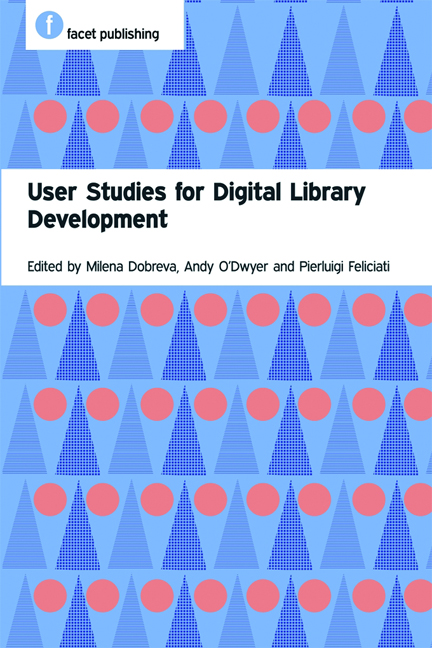Book contents
- Frontmatter
- Contents
- Preface
- Acknowledgements
- Abbreviations
- Glossary
- 1 Introduction: user studies for digital library development
- PART 1 SETTING THE SCENE
- PART 2 METHODS EXPLAINED AND ILLUSTRATED
- PART 3 USER STUDIES IN THE DIGITAL LIBRARY UNIVERSE: WHAT ELSE NEEDS TO BE CONSIDERED?
- 11 User-related issues in multilingual access to multimedia collections
- 12 Children and digital libraries
- 13 User engagement and social media
- 14 Significant others: user studies and digital preservation
- 15 The shift to mobile devices
- 16 Resource discovery for research and course design
- 17 Support for users within an educational or e-learning context
- PART 4 USER STUDIES ACROSS THE CULTURAL HERITAGE SECTOR
- PART 5 PUTTING IT ALL TOGETHER
- Index
17 - Support for users within an educational or e-learning context
from PART 3 - USER STUDIES IN THE DIGITAL LIBRARY UNIVERSE: WHAT ELSE NEEDS TO BE CONSIDERED?
Published online by Cambridge University Press: 08 June 2018
- Frontmatter
- Contents
- Preface
- Acknowledgements
- Abbreviations
- Glossary
- 1 Introduction: user studies for digital library development
- PART 1 SETTING THE SCENE
- PART 2 METHODS EXPLAINED AND ILLUSTRATED
- PART 3 USER STUDIES IN THE DIGITAL LIBRARY UNIVERSE: WHAT ELSE NEEDS TO BE CONSIDERED?
- 11 User-related issues in multilingual access to multimedia collections
- 12 Children and digital libraries
- 13 User engagement and social media
- 14 Significant others: user studies and digital preservation
- 15 The shift to mobile devices
- 16 Resource discovery for research and course design
- 17 Support for users within an educational or e-learning context
- PART 4 USER STUDIES ACROSS THE CULTURAL HERITAGE SECTOR
- PART 5 PUTTING IT ALL TOGETHER
- Index
Summary
Introduction
Learning has often been associated with particular physical spaces, whether formal classrooms or lecture theatres, or more informal spaces such as a workshop or studio. However, learning spaces have been changing, and moving either partly or fully online (Brown, 2005), leading to new and different learning and teaching experiences.
Emergent technologies – from the earliest electronic resources to virtual learning environments (VLEs), communications tools and social media – have enabled a radical shift in how educational space may be defined (Lave and Wenger, 1991) and an increasing blurring of the relationship between learning spaces and the other online spaces a learner may inhabit. Even the most traditional offline course should expect some or many participants to be engaged in the recreational use of social media. Nearly half of all respondents to the 2009 Oxford Internet Survey reported having created a profile on a social networking site (Dutton, Helsper and Gerber, 2009) and this looks likely to rise: the Pew Internet and American Life Project found that 73% of American teenagers used social networking sites (Lenhart et al., 2010).
For me, the net is a wonderful learning network and for some it is a lifeline and for others it is a tether to their boss or a source of harmful misinformation, disinformation, and distraction. Since when is the world starkly divided into eitheror alternatives?
Howard Rheingold (quoted in Anderson and Rainie, 2010, 13)The modern learning experience takes place in a hybrid space that merges the physical and the digital, the formal with the informal, and increasingly shares responsibility between the educator and the empowered learner. Digital library (DL) providers can engage in new ways with users, changing the ways in which resources are used and valued. However, the rules and behaviours of elearning and online social spaces are still (and likely will remain) in flux, with privacy concerns and the potential for bullying both important as social media spaces are brought into the elearning process (Davis and Lee, 2008; Keashly and Neuman, 2010).
- Type
- Chapter
- Information
- User Studies for Digital Library Development , pp. 179 - 188Publisher: FacetPrint publication year: 2012
- 1
- Cited by



